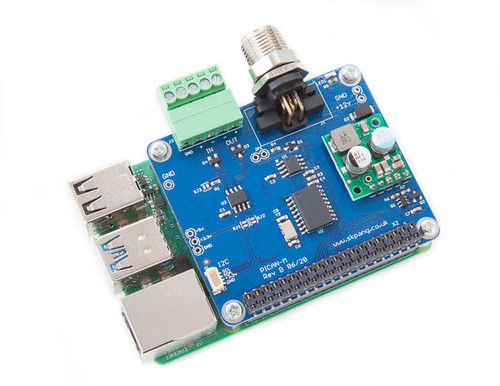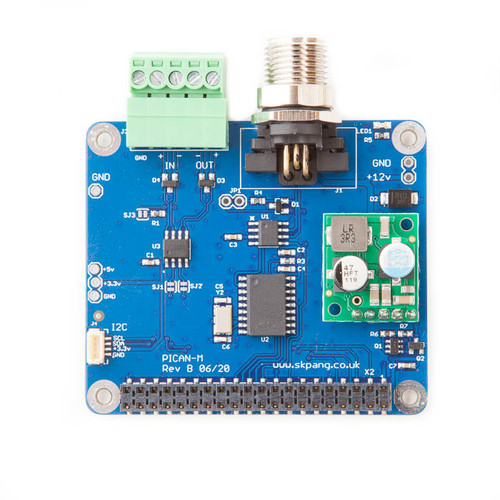Blog
Recent Posts
Exploring Copperhill Technologies' NMEA 2000 PICAN-M HATs for Raspberry Pi
Posted by on
 Copperhill Technologies has established itself as a prominent supplier of embedded systems and hardware solutions for applications in industrial, automotive, and maritime domains. Among its innovative offerings is the NMEA 2000 PICAN-M HAT, a Hardware Attached on Top (HAT) module designed specifically for the Raspberry Pi platform. This HAT is tailored to support NMEA 2000 networks, a marine data communication standard, allowing users to integrate Raspberry Pi devices into modern marine systems. This essay explores the features, benefits, and applications of the NMEA 2000 PICAN-M HAT and its role in enhancing Raspberry Pi's capabilities for maritime data integration and monitoring.
Copperhill Technologies has established itself as a prominent supplier of embedded systems and hardware solutions for applications in industrial, automotive, and maritime domains. Among its innovative offerings is the NMEA 2000 PICAN-M HAT, a Hardware Attached on Top (HAT) module designed specifically for the Raspberry Pi platform. This HAT is tailored to support NMEA 2000 networks, a marine data communication standard, allowing users to integrate Raspberry Pi devices into modern marine systems. This essay explores the features, benefits, and applications of the NMEA 2000 PICAN-M HAT and its role in enhancing Raspberry Pi's capabilities for maritime data integration and monitoring.
Overview of NMEA 2000 and PICAN-M HAT
NMEA 2000 is a robust communication protocol widely used in marine environments for interconnecting navigation instruments, engine data, sensors, and other devices. It facilitates seamless data sharing on a single backbone, ensuring interoperability among devices from different manufacturers.
The NMEA 2000 PICAN-M HAT is designed to bridge the gap between the Raspberry Pi and an NMEA 2000 network. As an add-on board, it equips the Raspberry Pi with a Microchip MCP2515 CAN controller and an MCP2562 CAN transceiver, enabling efficient handling of Controller Area Network (CAN) communication. The HAT also includes a Microchip ATA6561 CAN transceiver designed to meet the stringent requirements of the NMEA 2000 protocol. With its 5-pin header, it directly interfaces with NMEA 2000 networks, making the Raspberry Pi a versatile tool for data collection and analysis.
Key Features
The NMEA 2000 PICAN-M HAT boasts several features that make it an invaluable asset for marine developers and enthusiasts:
- CAN Bus Integration: By leveraging the MCP2515 and MCP2562 chipsets, the HAT ensures seamless communication with CAN-based devices, a crucial aspect of NMEA 2000.
- Compact and Modular Design: The HAT aligns with the Raspberry Pi’s form factor, making it compact and easy to deploy in embedded systems.
- Open-Source Support: The HAT is supported by open-source libraries and tools, simplifying development and integration. Users can configure and program the device with Python, C, or other compatible programming languages.
- NMEA 2000 Connector: The 5-pin connector provides direct access to NMEA 2000 networks, eliminating the need for complex wiring or adapters.
Applications
The NMEA 2000 PICAN-M HAT opens up numerous possibilities for marine applications:
- Navigation Systems: By connecting to GPS modules, chart plotters, and autopilot systems, the HAT enables advanced navigation solutions.
- Marine Data Logging: Researchers and enthusiasts can use the Raspberry Pi to log engine performance, fuel consumption, and environmental data for analysis and optimization.
- Remote Monitoring: Combined with IoT capabilities, the HAT allows for remote monitoring of vessel systems, enhancing safety and maintenance efficiency.
- Custom Dashboards: Developers can create custom graphical user interfaces (GUIs) on the Raspberry Pi to display NMEA 2000 data in real time.
Advantages of Using Raspberry Pi with PICAN-M HAT
Integrating the NMEA 2000 PICAN-M HAT with a Raspberry Pi offers several advantages:
- Affordability: Compared to traditional marine-grade computing systems, the Raspberry Pi provides a cost-effective alternative for NMEA 2000 integration.
- Flexibility: The open-source ecosystem around Raspberry Pi allows developers to customize their applications without the constraints of proprietary systems.
- Portability: The compact size and low power consumption of the Raspberry Pi make it ideal for portable marine applications.
- Community Support: Raspberry Pi's extensive community provides a wealth of resources, tutorials, and tools to simplify development.
Challenges and Considerations
Despite its advantages, users should consider a few challenges when working with the NMEA 2000 PICAN-M HAT. Proper configuration of CAN bus settings, adherence to NMEA 2000 guidelines, and the need for marine-grade power supplies are essential for successful deployment. Additionally, users must ensure software compatibility and robust housing to protect the Raspberry Pi from marine environmental factors like moisture and vibration.
Conclusion
Copperhill Technologies' NMEA 2000 PICAN-M HAT represents a significant leap in integrating Raspberry Pi into marine systems. With its versatile features, robust design, and support for the NMEA 2000 protocol, the HAT enables developers and hobbyists to create cost-effective, powerful, and customized solutions for maritime data communication. By bridging the gap between open-source hardware and industry-standard protocols, the NMEA 2000 PICAN-M HAT demonstrates the potential of Raspberry Pi as a cornerstone in modern marine electronics. Whether for navigation, monitoring, or data analysis, this HAT empowers users to innovate and adapt to the ever-evolving needs of the marine industry.
 PICAN-M - NMEA 0183 & NMEA 2000 HAT For Raspberry Pi With SMPS
PICAN-M - NMEA 0183 & NMEA 2000 HAT For Raspberry Pi With SMPS
The PICAN-M (M = Marine) is a Raspberry Pi HAT with NMEA 0183 and NMEA 2000 connections. The NMEA 0183 (RS422) port is accessible via a 5-way screw terminal. The NMEA 2000 port is accessible via a Micro-C connector.
The board comes with a 3A SMPS (Switch Mode Power Supply), allowing to power the Raspberry Pi plus HAT from an onboard power source (12 VDC).
Literature on Maritime Electronics, Including NMEA 2000
Replacing Your Boat's Electrical System The electrical system on a boat is crucial for the operation of all manner of valuable and critical equipment, yet a simple failure or weakness can render these systems inoperable. In older boats, fatigued or damaged wiring can be problematic or even terminal, so Mike Westin shows how to replace a [...]
Embedded Systems for NMEA 2000 Support Marine Applications
Copperhill Technologies offers Arduino-Compatible NMEA 2000 development boards and an NMEA 0183/NMEA 2000 HAT for the Raspberry Pi, ideal for marine applications such as OpenCPN, OpenPlotter, Signal K, and CANBoat. Experience cutting-edge technology with our NMEA 2000 development and prototyping boards, specially crafted for marine applications. These boards are game changers, allowing you to develop and [...]
Extending ESP32 Functionality by Using Raspberry Pi HATs
The ESP32 processor integrates peripherals such as UART, CAN Bus, WIFI, and Bluetooth, allowing a wide range of applications. Its low price adds to its popularity. Various ESP32 development boards, such as the ESP32-WROOM-32, are available in the market, as shown to the left. However, compared to popular systems like the Raspberry Pi or Arduino, the [...]
Testing NMEA 0183 For The PICAN-M - NMEA 0183 & NMEA 2000 HAT For Raspberry Pi
PICAN-M - NMEA 0183 & NMEA 2000 HAT For Raspberry Pi Our PICAN-M (M = Marine) is a Raspberry Pi HAT with NMEA 0183 and NMEA 2000 connection. The NMEA 0183 (RS422) port is accessible via a 5-way screw terminal. The NMEA 2000 port is accessible via a Micro-C connector. The board comes with a 3A SMPS (Switch [...]
NMEA 2000 Powered Computer System With Raspberry Pi 4, NMEA 2000 HAT, Pre-Installed OpenPlotter And Signal K
Copperhill Technologies offers various NMEA 2000 compatible embedded systems, including HATs for the Raspberry Pi and the Arduino-compatible line of Teensy modules. The NMEA 2000 standard defines a low-cost, modest capacity, bi-directional, multi-transmitter, multi-receiver instrument network. The hardware layer utilizes the CAN (Controller Area Network) technology. Typical data on an NMEA 2000 network include: Position latitude and longitude GPS [...]
How To Build A GPS To USB Interface, Including A Real-Time Clock, Within Minutes
Well, yes, it takes literally only minutes to assemble and test a GPS sensor plus real-time clock through the USB port on your computer, and that computer can be a Windows PC, Mac, any Linux system such as the Raspberry Pi, or even an Android system. All it takes is having the right components and [...]
 Loading... Please wait...
Loading... Please wait...
